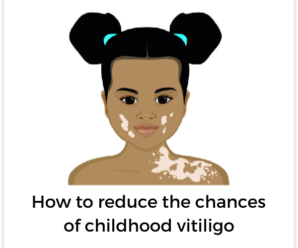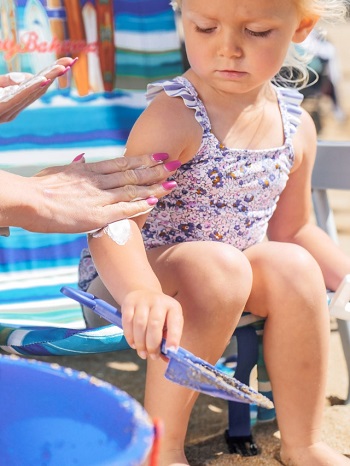
How can I reduce the chances of Vitiligo in my child if I have Vitiligo?
In our previous article, we discussed that due to genetic component, vitiligo sometimes run into families and around 20-30% of people with vitiligo have a family history of this skin condition where someone in their immediate family (such as siblings or parents) or close relatives (such as grandparents, cousins, uncles and aunts) also have vitiligo.
Out of these 20-30% incidences, if we have to identify only those cases where children inherit vitiligo from a parent, it would be around 10% or even less.
So, it is not compulsory for your child to get vitiligo strictly on the grounds of genetic component.
As explained in the previous post, faulty genes alone cannot trigger autoimmunity until some other prominent reason also plays a part, such as chronic stress, poor digestive health, chronic illness, infections, skin injuries, overuse of steroidal medications or certain environmental factors.
For example- if a child has a family history of vitiligo and s/he gets sick often, then the risk of getting vitiligo get manifolds.
To sum up, a number of diseases have a genetic component so does the vitiligo and genetics alone does not become the ground for vitiligo inheritance until some other prominent reason for autoimmunity comes into play.
In case you are a parent with vitiligo, let us discuss some of the useful guidelines that will further reduce the risk of vitiligo in your child.
Encourage your child to adopt a healthy diet and lifestyle
Every autoimmune disorder, whether diabetes or vitiligo, are benefited by adopting an overall healthy lifestyle.
So, First of all, make sure that the child follows a healthy diet and lifestyle.
For a sound and healthy physical and emotional well being, make sure the child has sufficient sleep and a balanced, regular daily routine.
Try to nurture healthy eating habits in the child with fruits, vegetables and whole foods given preference over packaged, processed foods stuffed with refined sugar, salt, refined white flour and saturated fats.
Encourage the child to join you in physical workout, yoga, meditation or any such exercise that is joyful and beneficial at the same time.

Do not put too much pressure on the child for studies or career
You must explain your child the importance of study and why a good academic performance is required to build a good career.
But it should be done in a balanced manner.
Putting excessive pressure brings un-necessary stress and anxiety and as we all know, stress is such a big trigger for vitiligo.
Prevent obesity in your child
Being obese is not good for your health for various reasons. Right? Now, add the higher risk of autoimmunity to that long list of reasons.
Obesity is a trigger for autoimmunity not only in the adults, but in kids also. (1, 2, 3, 4)

A study performed at Northwestern University School of Medicine, Chicago, suggested that childhood obesity increases the possibility of autoimmune problems.
So as your child is already susceptible to vitiligo due to genes, it is important to avoid this obesity factor.
Protect the skin when outside
Sunburn, due to over exposure to sunrays, can be a trigger for vitiligo.
Hence, if your child enjoys playing outdoor games under the sun, protect the skin from over exposure to sunlight by applying a sunscreen lotion or covering the skin with full sleeve clothes.

Keep your child smoke-free
Smoking (tobacco) is a bigger trigger for autoimmunity than obesity. (5, 6)
If you are already dealing with an autoimmune disease, regular smoking got the potential to worsen it.
If someone in your family got an autoimmune disease, regular smoking can activate the autoimmunity causing genes in your body.
Hence, smoking is a big no for anyone with an autoimmune disease or having a family history of autoimmunity.
Keep your teenage child away from this bad habit any how.
Moreover, passive smoking is also dangerous and can be a contributing factor for autoimmunity. (6)
So, not only save your child from this habit, if you or anyone else in the family smoke, try to make that person quit smoking as well.
To sum up, all those factors that can increase the risk of autoimmunity should be avoided in your child’s life.
Try to learn about these risks yourself and educate your child also.
Let your child be a child.
In the efforts to safeguard your child from the risk of autoimmunity, make sure you do not become a super strict parent.
Try to understand your kid’s personality and interests and let your kid do what s/ he loves to do.
To play games, make innocent mistakes and feast on favorite foods- all these things are an integral part of a joyful childhood.
A vibrant childhood will eventually make your kid a physically strong and emotionally stable human being.
On the other hand, too disciplined childhood can cause low self-esteem, anxiety, lack of sleep and poor academic performance.
In short, be a balanced parent that offers love, affection and support and at the same time s/he is firm and clear headed in enforcing discipline and limits.


